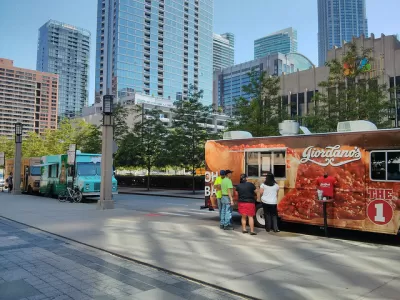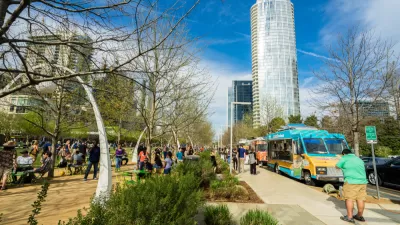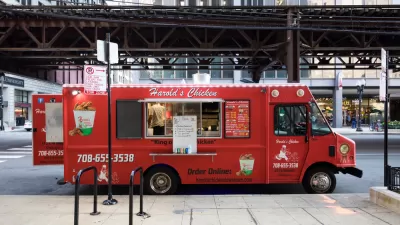In Chicago, food trucks are disappearing and some blame the city’s stepped up enforcement of regulations and fines.

In cities around the U.S., the food truck industry is growing. "In LA County there are currently 2,600 permits for food trucks; Minneapolis, where winters are harsher than they are in Chicago, has 80 to 90 trucks; and Washington, D.C., has 100, according to representatives of those cities' local food truck associations," Julia Thiel reports for the Chicago Reader. Those numbers contrast sharply with those of Chicago, where the city only supports 70 licensed trucks. That number is approximately half what the city had in 2012.
Gabriel Wiesen, president of the Illinois Food Truck Association, argues that the difference between Chicago and those other cities is regulation. In Chicago the laws "…prohibit the trucks from parking within 200 feet of any business that sells food (including convenience stores and pharmacies), and from remaining in the same spot for more than two hours," Thiel reports. These rules have become more difficult to coexist with since a 2012 report in the Sun Times criticized the city for its lax enforcement, which lead to a crackdown.
FULL STORY: Why Chicago’s once-promising food truck scene stalled out

Maui's Vacation Rental Debate Turns Ugly
Verbal attacks, misinformation campaigns and fistfights plague a high-stakes debate to convert thousands of vacation rentals into long-term housing.

Planetizen Federal Action Tracker
A weekly monitor of how Trump’s orders and actions are impacting planners and planning in America.

San Francisco Suspends Traffic Calming Amidst Record Deaths
Citing “a challenging fiscal landscape,” the city will cease the program on the heels of 42 traffic deaths, including 24 pedestrians.

Defunct Pittsburgh Power Plant to Become Residential Tower
A decommissioned steam heat plant will be redeveloped into almost 100 affordable housing units.

Trump Prompts Restructuring of Transportation Research Board in “Unprecedented Overreach”
The TRB has eliminated more than half of its committees including those focused on climate, equity, and cities.

Amtrak Rolls Out New Orleans to Alabama “Mardi Gras” Train
The new service will operate morning and evening departures between Mobile and New Orleans.
Urban Design for Planners 1: Software Tools
This six-course series explores essential urban design concepts using open source software and equips planners with the tools they need to participate fully in the urban design process.
Planning for Universal Design
Learn the tools for implementing Universal Design in planning regulations.
Heyer Gruel & Associates PA
JM Goldson LLC
Custer County Colorado
City of Camden Redevelopment Agency
City of Astoria
Transportation Research & Education Center (TREC) at Portland State University
Jefferson Parish Government
Camden Redevelopment Agency
City of Claremont




























